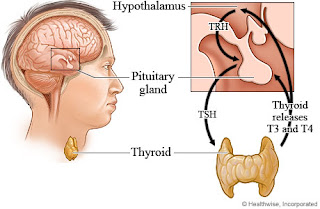Carbohydrates:- Your Diets Fuel
What are carbohydrates?
Carbohydrates are an ideal source of energy to the body.
They play a critical role in the proper functioning of the immune system,
fertilization, blood clotting and human development.
How food is converted to fuel in our body?
The food in our body is digested by mixing it with acids and
enzymes in the stomach. The digested
carbohydrates in our stomach is broken to another type of sugar called
“glucose”. The stomach and small
intestines absorb the glucose and then release it into the blood stream. Once
the glucose makes it to the blood stream, it is immediately used for energy or
stored in our bodies, to be used later.
The role of insulin in our body:-
Insulin is a hormone secreted by beta cells in the pancreas
and it helps to store glucose for energy. Without insulin, the glucose stays in
the bloodstream therefore increasing the blood sugar levels.
Rich sources of carbohydrates-
The healthiest sources of carbohydrates are,unprocessed or minimally
processed whole grains, vegetables, fruits and beans—promote good health by
delivering vitamins, minerals and
fibers.
Poor sources of carbohydrates-
Unhealthier sources of carbohydrates include
white bread, pastries, sodas, and other highly processed or refined
foods. These items contain easily digested carbohydrates that may
contribute to weight gain, interfere with weight loss, and promote diabetes and
heart disease.
Recommended Dietary Allowances for Carbohydrates:-
Why a Sugar High Leads to a Brain Low
Brain requires a constant supply of blood glucose in order
to function properly, contrary to this eating refined sugars or slurping in
sodas is not the right intake.On the contrary, researchers at the Salk
Institute in California found that high glucose levels resultingfrom quick, easy sugar intake slowly but surely
damage cells everywhere in the body, especially those in the brain.
Unfortunately, having too little glucose and having
too much glucose are both problematic. When your blood sugar levels drop, your
hypothalamus sends out a distress signal that leads to the release of
adrenaline to your liver, ordering it to turn excess fat into glucose. When you
consume too much sugar, your pancreas secretes insulin to nudge that extra
sugar into your cells, and too much insulin can deplete your normal glucose
levels, depress your immune system, and lead to kidney disease. Plus, excess
insulin also promotes fat storage, which sets up a vicious cycle. Either
extreme can leave you feeling woozy, nervous, fatigued, and shaky.
-Masooma Fatima
(B.Sc Nutrition)







Comments
Post a Comment